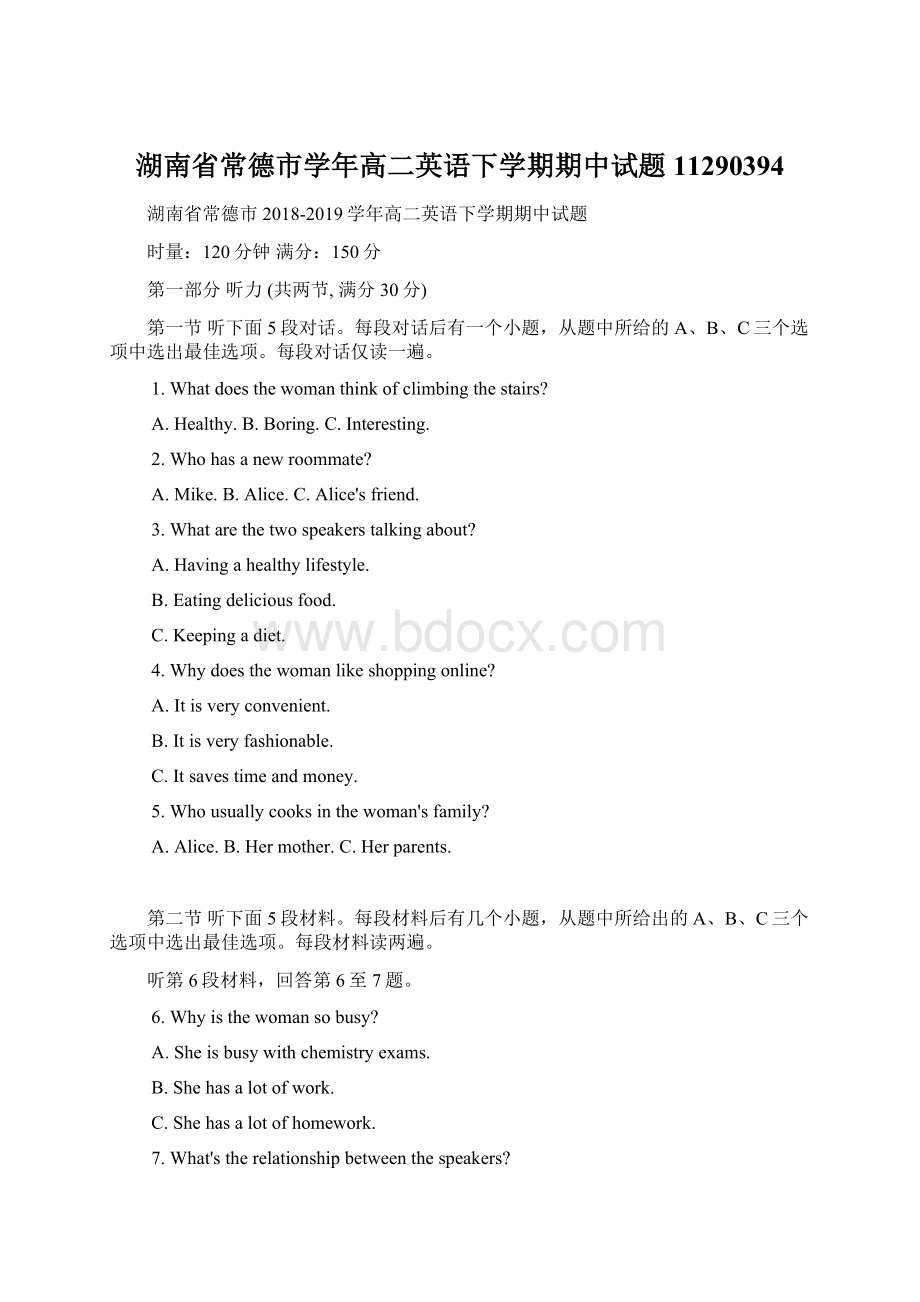湖南省常德市学年高二英语下学期期中试题11290394.docx
《湖南省常德市学年高二英语下学期期中试题11290394.docx》由会员分享,可在线阅读,更多相关《湖南省常德市学年高二英语下学期期中试题11290394.docx(15页珍藏版)》请在冰豆网上搜索。

湖南省常德市学年高二英语下学期期中试题11290394
湖南省常德市2018-2019学年高二英语下学期期中试题
时量:
120分钟满分:
150分
第一部分听力(共两节,满分30分)
第一节听下面5段对话。
每段对话后有一个小题,从题中所给的A、B、C三个选项中选出最佳选项。
每段对话仅读一遍。
1.Whatdoesthewomanthinkofclimbingthestairs?
A.Healthy.B.Boring.C.Interesting.
2.Whohasanewroommate?
A.Mike.B.Alice.C.Alice'sfriend.
3.Whatarethetwospeakerstalkingabout?
A.Havingahealthylifestyle.
B.Eatingdeliciousfood.
C.Keepingadiet.
4.Whydoesthewomanlikeshoppingonline?
A.Itisveryconvenient.
B.Itisveryfashionable.
C.Itsavestimeandmoney.
5.Whousuallycooksinthewoman'sfamily?
A.Alice.B.Hermother.C.Herparents.
第二节听下面5段材料。
每段材料后有几个小题,从题中所给出的A、B、C三个选项中选出最佳选项。
每段材料读两遍。
听第6段材料,回答第6至7题。
6.Whyisthewomansobusy?
A.Sheisbusywithchemistryexams.
B.Shehasalotofwork.
C.Shehasalotofhomework.
7.What'stherelationshipbetweenthespeakers?
A.Colleagues.B.Classmates.C.Teacherandstudent.
听第7段材料,回答第8至10题。
8.Howoldisthegirlnow?
A.Six.B.Sixteen.C.Ten.
9.WhatdoesthewomanthinkofEnglish?
A.Ratherhard.B.Reallygood.C.Veryuseful.
10.Whatdoesthegirlenjoymost?
A.Listening.B.Writing.C.Talking.
听第8段材料,回答第11至13题。
11.Whydoesthemandislikehisneighbors?
A.Theyaredangeroustohim.
B.Theirdogisnoisy.
C.They'vejustmovedhere.
12.What'sthemostlikelyrelationshipbetweenthetwospeakers?
A.Bossandworker.B.Patientanddoctor.C.Friends.
13.Whatdoesthewomanthinkoftheman?
A.Stubborn.B.Dangerous.C.Horrible.
听第9段材料,回答第14至17题。
14.HowmuchpocketmoneydoesLilygetamonth?
A.About20pounds.B.About15pounds.C.About5pounds.
15.WhencanLilyhavemorepocketmoney?
A.Whensheprovessheisgoodatherschoolwork.
B.Whenshenolongerargueswithhermum.
C.Whensheisoldenoughinhermum'seyes.
16.HowmuchpocketmoneydoesLily'sfriendsget?
A.MorethanLily's.B.LessthanLily's.C.ThesameasLily's.
17.WhatdoesDavidsuggestLilytodo?
A.Haveadiscussionwithhermum.
B.Arguewithhermumaboutthepocketmoney.
C.Sitdownandwaitcalmly.
听第10段材料,回答第18至20题。
18.HowoldwasJoel?
A.3yearsold.B.4yearsold.C.1yearsold.
19.Whydidthespeakerandherfamilystopatarestaurant?
A.Togetreadyforthezoo.
B.Tohavelunch.
C.Tolookfortheglasses.
20.Wheredidthehusbandputhisfoot?
A.Ontheelephant.B.Onhisshirt.C.Onhisglasses.
第二部分阅读理解(共两节,满分34分)
第1节(共12小题,每小题2分,满分24分)
阅读下列短文,从每题所给的四个选项(A、B、C和D)中,选出最佳选项,并将答案写在答题卡上的相应位置。
A
JacksonvilleisthelargestcityinFloridaandhasmanyshoppingmalls(购物中心)tomeetdifferenttastesfortouristsandgueststoshop.HerearesomegreatplacesyoucanshopinJacksonville.
GatewayTownCentre
GatewayTownCentreisoneofJacksonville'soldestshoppingmalls,withmanyexcitingstores!
GatewayTownCentreisat5184NorwoodAvenueandownsamixtureofretailboutiques(零售时装店),likeFootLockerandAshleyStewart.YoucanvisittheGatewayTownCentreMondaythroughSaturdayfrom10:
00a.m.to9:
00p.m.,andSundaysfromnoonto6:
00p.m.
StJohnsTownCentre
ThenewestshoppingcentreinthecityisStJohnsTownCentre.ThiscentrehasallyournationalfavouriteslikeDillard's,Barnes&NobleandTargetaswellasagreatmanyrestaurants.StJohnsTownCentreisopenfrom10:
00a.m.to9:
00p.m.MondaythroughSaturday,and11:
00a.m.to6:
00p.m.onSundays.
RegencySquareMall
On9501ArlingtonExpresswaystandstheRegencySquareMall.Thechildrenlikeridingonthemall'sminitrainwhileadultsliketoshopandsocialise.MoviefanswilllikeknowingthattheRegencySquareMallhasa24-screenAMCtheatre.Youcanvisitthismallfrom10:
00a.m.to9:
00p.m.MondaythroughSaturday,andSundaysfromnoonto6:
00p.m.
RiverCityMarketplace
RiverCityMarketplaceinJacksonvilleisthelargestshoppingmallinthecitywith70shopswhichcomprisesuchstoresasLowe's,WalMartSupercentre,PetSmartandOldNavy.Alltheseshopscanbefoundattheopenairsquare.Themall's14-screenHollywoodtheatresareagreatattractionformovielovers.RiverCityMarketplace'shoursofoperationare9:
00a.m.to9:
00p.m.MondaythroughSaturday,and11:
00a.m.to7:
00p.m.onSundays.
21.WhatcanwelearnabouttheGatewayTownCentre?
A.
ItistheoldestmallinJacksonville.
B.
ItopensforonlyhalfadayonSundays.
C.
ItisinterestingtoshopthereonSundaymornings.
D.
Ithasallkindsofclothesfortheyoung.
22.WecandoallthefollowingattheRiverCityMarketplaceEXCEPT .
A.
watchingmovies
B.
enjoyingtheopenair
C.
shoppinginWalMartSupercentre
D.
ridingonthemall'smini-trainwiththechildren
23.Whatdoestheunderlinedword“comprise”inthelastparagraphmean?
A.includeB.describeC.useD.visit
24.Whereisthispassageprobablytakenfrom?
A.
Asciencemagazine.
B.
Aresearchpaper.
C.
Anadvertisement.
D.
Atextbook.
B
Spendingtimeonlineisnormalbehaviorforteenagers.ButtoomuchInternetusebyteens—ortoolittle,forthatmatter—mightberelatedtodepression,anewstudyfinds.
Thefindings,reportedinthejournalofPediatrics,donotmeanthattheInternetistoblame.Forone,teensinthestudywhospentnotimeonlinewerealsoatincreasedriskofdepressionsymptoms.
Instead,theresearcherssaythatbothheavyInternetuseandnon-usecouldserveassignalsthatateenagerishavingahardtime.
Forthestudy,Dr.Pierre-AndreMichaudandcolleaguesattheUniversityofLausanne,Switzerland,surveyed7,200individualsages16to20abouttheirInternetuse.
Thosewhowereonlinemorethantwohoursperdaywereconsidered"heavy"Internetusers,whilethoseonlineanywherefromseveraltimesperweektotwohourswereconsidered"regular"users.
Theteenagersalsoansweredanumberofhealth-relatedquestions,includingsomestandardquestionsabout"depressivetendencies"thatgauge(测量)howoftenapersonfeelssadorhopeless.
ComparedwithregularInternetusers,thestudyfound,kidswhowereheavyusersornon-usersweremorelikelytobedepressedorverydepressed.
Amongmaleteens,heavyusersandnon-userswerebotharoundone-thirdmorelikelytohaveahighdepressionscore,comparedto"regular"users.Amonggirls,heavyInternetusershadan86percentgreaterchanceofdepression,whilenon-usershada46percentgreaterlikelihoodcomparedtoregularusers.
Thatwaswithfactorslikefamilyincomeandanychronichealthproblemstakenintoaccount.However,theaveragedepressionscoresamongnon-users,regularusersandheavyusersalikewerealltowardsthelowerend—between1and2onascaleof1to4,withonebeing"notdepressedatall".
25.Accordingtothepassage,whatmaycausetheteenagers'depression?
A.
Surfingonlineandchattingonlineregularly.
B.
Spendingtoolittletimeonline.
C.
Spendingtoomuchtimeonline.
D.
BothBandC.
26.Fromthenewstudyinthepassage,weknowthat .
A.
theInternetistoblamefortheteenagers'depression
B.
girlswhoareaddictedintheInternetaremorelikelytosufferdepression
C.
boyswhoareaddictedintheInternetaremorelikelytosufferdepression
D.
theteenagershavetoanswerquestionslikefamilyincomeandhealthproblems
27.Thepassageisdevelopedby .
A.
examples
B.
comparisons
C.
figures
D.
inference
28.What'stheauthor'sattitudetotheproblem?
A.
Satisfied.
B.
Disappointed.
C.
Anxious.
D.
Worried.
C
Weoftensmileattimes.However,themeaningofasmileindifferentculturesmaybedifferent.Dependingondifferentcultures,smilingcanexpressjoyandamusement,butitcanalsoindicateembarrassment.Thefollowingexamplesshowthispointofview:
Inanattempttobeopenandfriendly,peopleintheUnitedStatessmilealot.Everyonesmilesateachother,thisnonverbalcommunicationshowsbeingfriendlyintheUnitedStates.However,inChina,smilingisnotonlyanexpressionofhappiness,butalsoawaytoavoidbeingembarrassed.Chinesepeoplelikesmilingwhentheyareembarrassedinordertoavoidembarrassment.Smilingisakindofgoodwillbutnotsneer.Forexample:
Whenachildfallsofffromabike,theadultsinChinamaysmile,whichisakindofgentleencouragementandmaynotbeakindofimpolitelaugh.
WhenapersonfromtheUnitedStatesmightblushwithembarrassmentorbecomeoffensive,aChinesemightblushwithsmile.Toavoidseriousmisunderstanding,peoplewhoengageininterculturalcommunicationshouldbeabletounderstandthemeaningofsmilingappropriately.Relatedtothesmileisthelaugh.Also,differentcultureshavedifferentmeaningsaboutlaugh.Forexample,Americanscanenjoyaveryheartfeltbellylaughthatcomesfromthedeepestemotions.However,mostChineseseldomlaughthatwaybecausetheyarethoughttobesillyexceptamongclosefriends.
29.Wecanusesmiletoexpressallofthefollowingfeelingsexcept_________,
A.joyandhappinessB.amusementC.embarrassmentD.fear
30.PeopleoftensmileateachotherintheUnitedStatesbecause_________.
A.theyareveryhappyB.theywanttoshowtheyarefriendly
C.theywanttohidetheirtruefeelingsD.theywanttoavoidembarrassment
31.InChina,seeingachildfallsoffabike,anadultwillsmileinorderto________.
A.laughathimB.avoidhisownembarrassment
C.avoidembarrassmentandencouragetheboyD.showhispoliteness
32.Whatismainlytalkedaboutinthepassage?
A.Peoplesmileattimes.
B.Smilingcanexpressdifferentfeelingsdependingondi